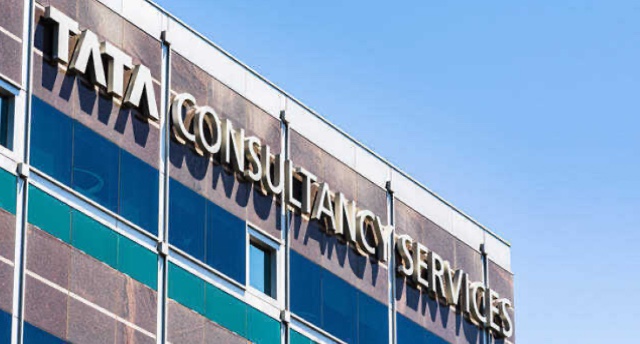
TCS posts weak Q1 earnings; AI-led strategies, tech deals drive growth


Tata Consultancy Services (TCS), on Thursday, announced that its Q1 FY26 growth was driven by Artificial Intelligence (AI) and data, TCS Interactive, and cybersecurity, as clients focused on scaling AI, transforming contact centres, optimising costs, and improving cyber defenses. The quarter was overall a weak one for the
The country’s largest IT services company reported a consolidated net profit of ₹12,760 crore for Q1 FY26, a 4.38% increase from ₹12,224 crore in Q4 FY25. Consolidated revenue, however, decreased by 1.6% to ₹63,437 crore from ₹64,479 crore in the previous quarter, or 0.6% to $7,421 million from $7,465 million in dollar terms.
K Krithivasan, Chief Executive Officer and Managing Director, said, “The continued global macroeconomic and geopolitical uncertainties caused a demand contraction. On the positive side, all the new services grew well. We saw robust deal closures during this quarter.”

The company's Total Contract Value (TCV) for the quarter stood at $9.4 billion, down from $12.2 billion clocked in Q4. Most of the deals for the quarter ended July 2025 included technology transformation, vendor consolidation, AI-powered intelligent automation, and SAP S4/HANA transformations.
Some of its notable digital transformation deal includes a quantum algorithm development with IBM; offering clients enterprise data transformation and management for a large Canadian Bank; running cloud operations for a global energy equipment manufacturer; empowering business leaders with GenAI decision-making tools through Vianai Systems; modernising ICICI Securities' trading platform with TCS BaNCS, to name a few.
The firm has also bagged digital transformation deals for Jazeera Airways, a technology innovation for Salling Group; accelerating Virgin Atlantic's digital transformation, expanding capabilities in Software-Defined Vehicles (SDV) with new Automotive Delivery Centres; solidifying a 15-year partnership with Kingfisher Plc for IT application and infrastructure support, and many more.

The company’s AI and Data unit experienced robust growth, driven by AI-led transformation, IT-Ops automation, and data-platform modernisation. The Cloud unit was reorganised to strengthen its hybrid cloud proposition, with continued traction in Cloud Contact Centre transformation, legacy modernisation, and Cognitive Enterprise Network Services.
Cybersecurity was also a robust area with more customers focusing on identity and access management, managed detection and response, and governance, risk, and compliance services. Moreover, clients are investing in AI-powered Software-as-a-Service (SaaS) platforms for streamlining workflows, with Technology Services, Manufacturing, and Healthcare leading growth.
The company’s Internet of Things (IoT) & Digital Engineering unit saw increasing investments in plant transformation and connected IoT platforms, particularly in Utilities, Energy, and Life Sciences. Moreover, TCS Interactive focused on operational excellence and innovation, using AI for improved performance and customer experience.

TCS said that it added 6,071 employees during the April-June 2025 quarter. With this, the total number of TCS employees stood at 6,13,069 as of June 30.
According to a TCS statement released on July 10, the company’s IT services attrition rate (last twelve-month basis) inched up to 13.8% in Q1FY26, compared with 13.3% in the previous quarter. The attrition had stood at 13% in the December 2024 quarter. Milind Lakkad, Chief HR Officer, said that TCS now has 1,14,000 people with higher-order AI skills.
“In this quarter, our associates invested 15 million hours in building expertise in emerging technologies, enabling them to lead the transformation journey for our customers,” he said.

DD Mishra, VP Analyst at Gartner, believes that TCS’ stable financial performance highlights the company’s successful execution of digital and AI-led strategies, as well as its commitment to staying at the forefront of technological innovation. “The company’s ability to adapt to clients’ changing technology needs and maintain momentum in driving large-scale digital transformation initiatives globally is commendable,” he said.
However, Mishra mentioned that TCS, like many in the industry, continues to navigate challenges such as talent retention and evolving client budgets for technology investments.
"Despite these hurdles, TCS’ investments in upskilling, automation, and next-generation technologies have positioned it well for future growth and continued leadership in the IT services sector. It needs to watch out for volatile economic situations, geopolitical risks, and a slowdown of spending,” he mentioned.

Tata Elxsi reports weak Quarter
Meanwhile, another Tata Group company, Tata Elxsi saw its net profit fall by 22%. This decline is due to economic uncertainties and issues affecting R&D spending. The company's revenue also decreased by 3.7%. Weakness in the automotive sector contributed to this drop. Despite challenges, Tata Elxsi aims to protect its business and expand customer relationships.
In an interview with TechCircle in May, Sundar Ramachandran, VP of IT Systems, said that the company is working in the areas of AI, predictive analytics, GenAI and cloud computing, emphasising their transformative potential for IT. Despite the profit decline, Tata Elxsi said that it continues to invest in digital and AI technologies, with over 70% of its talent base now considered AI-ready.

